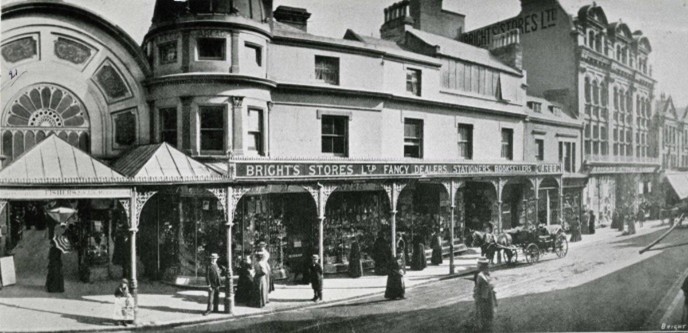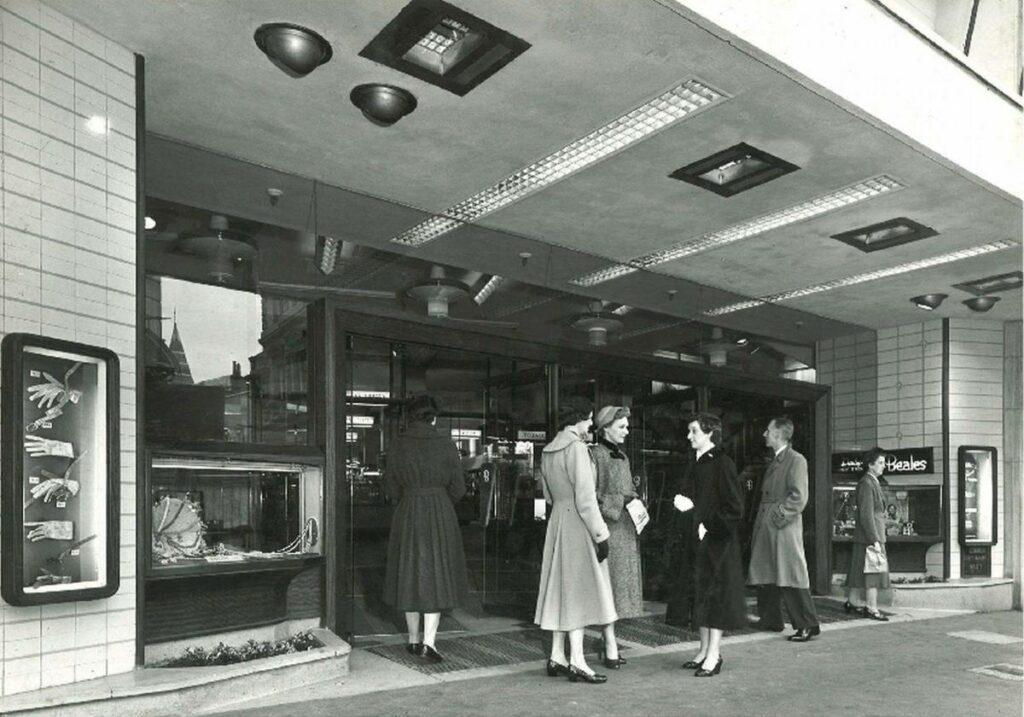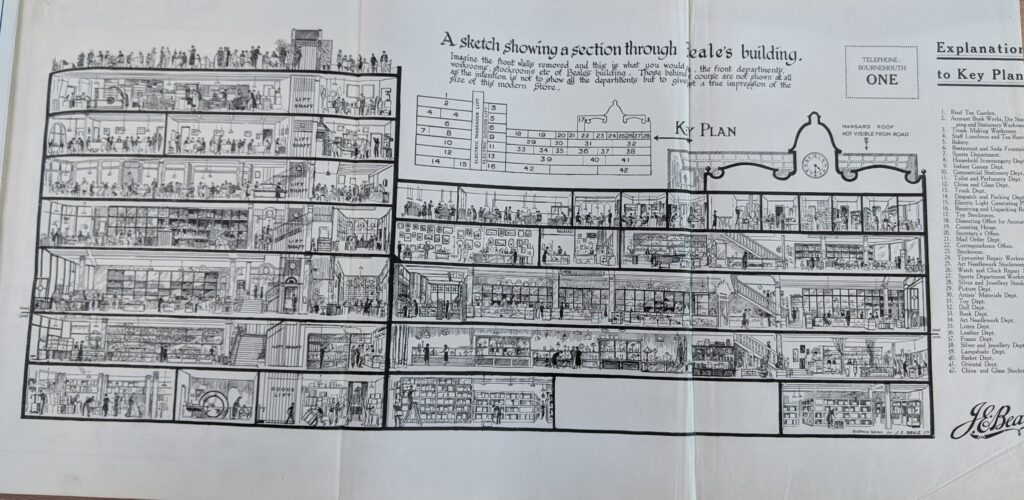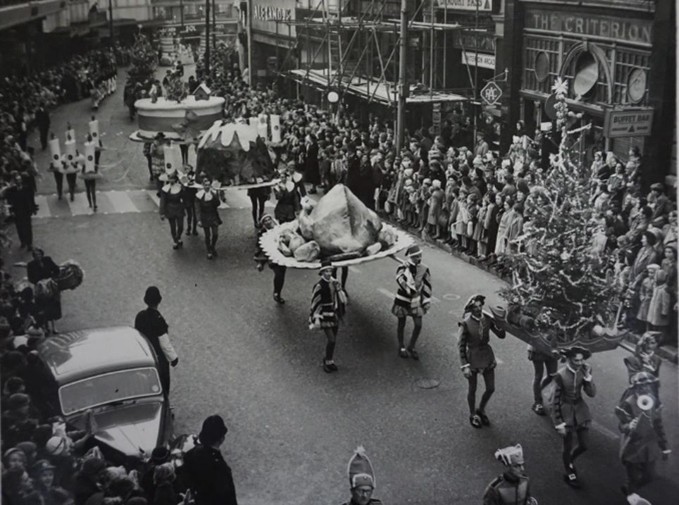Bournemouth’s real-life “Are you being served?”: The day-to-day and lives of Bournemouth’s Department store employees.
You may remember the BBC classic comedy “Are you being served?” that ran from 1972- 1985. Set in the fictional London department store, Grace Brothers, the show followed the antics of its staff in the menswear and ladies fashion departments. The programme was a family favourite and amassed audiences of over 20 million during its run, with a spin off aired in 1992 and even a 2016 remake as a part of the BBC’s celebration of tv sitcoms.
The show was based on writer, David Croft’s own experience working in the London department store, Simpson of Piccadilly in the 1950s. While the show was a highly dramatized and exaggerated version of life in a department store for the purpose of comedy, the real-life experiences of working in a department store were filled with just as much fun and community, as well as some hard work.
A local history project, run by historians at Bournemouth University and funded by the National Lottery Heritage Fund, interviewed Bournemouth locals who worked in Bournemouth department stores. The project aimed to uncover local memories about life at all the many department stores that lived on the high street throughout the decades. This article showcases these memories, through comparing the hilarious storylines of “Are you being served?” to the real-life memories of Bournemouth employees.
Bournemouth high street has been historically defined by the presence of department stores, almost from its establishment. With the opening of Beales in 1881,Brights in 1871 and Bobby’s in 1915, to name a few of the oldest. Department stores were the place to be, from high end products to everyday essentials, even a fun day out with restaurants and cafes. Bournemouth local, Brian, remembered that his “mother used to like them” and as a child he “used to be dragged round them occasionally, they were always popular…there were different sorts of levels I suppose there were the really expensive ones and there were just the slightly less expensive ones.”

Another local, Martin had fond memories of a birthday lunch he had once in the restaurant in Bobby’s, he said “sometimes mum and dad would maybe treat you to a birthday lunch at Beales, or Bealesons or Bobbys, I have memories of a birthday lunch at Bobby’s when I would have been 11.”
As time progressed, new stores opened, old ones changed management and names and eventually department stores all but left our high street completely. The most recent loss being House of Fraser, formerly Brights, in March 2022, and not so long before that, Beales in March 2020. The closure of department stores, not just in Bournemouth but nationally, brings about questions about the future of high streets, what they mean to the community now and how they will continue as functioning places of business.
“A Change is as Good as a Rest” (Season 5 Episode 2)
https://www.bbc.co.uk/programmes/b007bd23
In this iconic episode the staff are temporarily reassigned to the toy department, after a brief scare that they were all getting laid off. This misunderstanding led to senior Mr Grainger to resign and want his job back, but his position gets filled by Mr Humphries and Mr Humphries previous position filled by junior Mr Lucas, meaning the only position for Mr Grainger to take is Mr Lucas’ bottom of the ladder job, temporarily. Mr Lucas teases him about it throughout the episode making the most of his position over his usual boss. Captain Peacock gives them a tour of the new department very grumpily, because he had to come in on a Sunday to acquaint himself with the department. The staff find great amusement in demonstrating the toys and finding their way in the department. This was not without its issues and at lunch the staff go to the office to complain about the various issues working in the new department has caused. After a week of working in the department the staff get the hang of it, and on the last day of their time in the toy department the staff find they don’t want to leave!
While, in reality it was highly uncommon for whole departments to shift around, even temporarily, the demotion of Mr Grainger, demonstrated the significance of the hierarchy within the team, that was very rarely shaken up. This hierarchy was a very real part of employment in department stores, almost all our interviewees pointed out that there was a very strict hierarchy within the departments and in the store as a whole.
Martin describes the hierarchy within Bealesons, in which there was the store directors, then department managers who would run an entire floor, and below them would be the assistant department managers. There would also be buyers who dealt with the stock for several departments, on a par with the department managers. And at the very bottom of the chain would be junior sales assistants. This hierarchy was rigid. Therefore, the fictional shake-up of Mr Grainger, the menswear department manager being strung down the ladder to the junior salesman, would cause quite the turn around.

Shirley who worked as a window dresser in Bealesons and Beales in her youth, describes her experience as a junior in the window dressing department. She wasn’t even allowed to take down a window, let alone dress one within her first eighteen months of employment, so when she finally got the task of undressing a window in the store she was so pleased. As a junior, Shirley recalled being very much told what to do, and learning from shadowing and watching her superiors. When she first started in the department there were 3 junior girls, three senior girls and some men to help with the heavy lifting. Whilst at Beales, Shirley remembers being quite nervous around the two store managers, Elmes and Franke Beale, especially Elmes as she once saw him fire a girl for wearing the wrong footwear to work!
Overall, the hierarchy that dominated department stores, while it was quite strict, was integral to the system of a department store. Departments had to run independently of themselves, and the high standards of customer service and sales output required a strong pecking order, that employees could train and climb through, through indentures and experience. But this did not mean there was no fun between the staff at different levels.
“The Club” (Season 6 Episode 2)
https://www.bbc.co.uk/programmes/b007bb2k
This episode sees the staff offered a room in the basement where they may form their own social club. Mr Rumbold puts Peacock in charge of brainstorming the room, as the cost of having the room decorated professionally was out of the question. The staff struggle to co-ordinate and agree on any of the décor or activities for the room.
Community and socialising were a prominent part of life as an employee in the department stores in Bournemouth. Martin remembers being quite an active member of the community whilst working at Bealesons. He recalls how he met many interesting and great characters whilst training as a part of his indentured apprenticeship there, and there was a huge sense of community in the store. Many of the employees socialised in the same places outside of work, even people from other department stores in the high street, and Beales, the parent store of Bealesons, held sport teams and social events. Martin recalls not being a part of the sports teams due to his lack of interest in sports, but he was much more involved in the events, even attempting to organise one himself.
Pat, who worked in Bobby’s in 1964, recalled that the window dressing department had small parties that she attended, often drinking wine and socialising. She also remembers that Nigel Beale had a cricket club that all the other stores used to join in with, going on cricket trips and having a sing song on the coaches on their journeys. Similarly, Shirley, mentioned previously, also remembers a similar experience of clubs and outings, but especially the staff room in Beales that housed a dart board and table tennis, and the subsidised canteen.
Overall, the episode “The Club” was reflective of the realities of the friendship, community and socialisation that was a real part of working at Bournemouth department stores, especially Beales. While there may not have been a dedicated room given to each department to do whatever they wanted with for the purpose of leisure, fun and community driven events were prominent both inside and outside of work.
“Big Brother” (Season 2 Episode 4)
https://www.bbc.co.uk/programmes/b007br6f
This episode revolves around the installation of new security cameras in the shop, due to recent shop lifting. The first floor was to act as a guinea pig as the first ones to be fitted with the cameras, as well as the recruitment of former CID (criminal investigation department) detective, Mr Clegg to act as the store detective. Mr Clegg insists on checking the staff’s bags, and the staff soon find out that boss Mr Rumbold can see and hear everything they do, taking extensive notes on things to reprimand them for.
The issue of shoplifting and the implementation of CCTV and store detectives was a very real and important aspect of running department store. In the 1970s CCTV became an increasingly popular solution to manage business security in high-risk sites such as banks and department stores.[1] Bournemouth was even used as a test location to install CCTV in public spaces, such as car parks, squares and council property, controlled by the local authorities in 1985. The test was deemed successful leading to the first official use of public space CCTV by local government rolled out in Norfolk 1987.

The use of store detectives was common practice for department stores by the early 2000’s when Bournemouth local, Paul worked as a store detective for the Bournemouth Beales branch. Paul described his day-today life as a store detective, it would consist of roaming the floors, making sure to cover the hot areas for shoplifting, such as the perfume areas. He mentioned that there were different kinds of shoplifters, there were ones that stole because they wanted the stuff personally versus the kind that would steal things for resale, so he had to watch out for both types, but the personal thief was much less common. Paul remembers that occasionally “they still had the odd ‘granny’ who smelled the perfume and dropped it in their bag”, in which he had to learn to be very diplomatic with, often dealing with it by going up to them and saying “sorry my dear it seems you may have ‘inadvertently dropped some perfume in your bag”, rather than dragging them into the office or alerting authorities. He also described how the high street often worked collectively, having a radio station that store detectives and security personnel at different shops would all use so they could warn each other if a particular shoplifter was on the prowl or call for back up if it was ever need before authorities arrived.
While in the show the staff rebelled against store detective Mr Clegg, and the corrupt use of CCTV, in reality, CCTV and store detectives were an integral part of the team, making sure the store, its stock and staff were protected. Paul also highlighted how the nature of store security was changing, he mentioned how Beales was old fashioned in its notion of store presentation, in that whilst the store was still run by the Beales their idea was to not have electronic tags or electric batons at the door due to the look of them. However, as management was changing security was becoming more important and necessary, and Paul believed that sales rather than image was taking priority and these new technologies were implemented, not always with the support of the longer-term staff.
Christmas Crackers (season 3 episode 9)
https://www.bbc.co.uk/programmes/b00plwrj
Christmas time at department stores, has been and continues to be, iconic. From the great Christmas lights and decorations of Harrods today, to the local Christmas parade organised by Beales. The series’ first Christmas episode represents the festivities many department stores would have been involved in, both for the customers and for themselves. The episode starts with a meeting about boosting sales over the Christmas period, Rumbold announces that the staff are to dress up in costumes from nursery rhymes, in which each department is allocated a nursery rhyme. The staff go on to have a rather poorly executed Christmas lunch in the canteen, before dressing up in their costumes and singing Christmas songs in the props that decorated their department.
Christmas has always been an important and busy time for Bournemouth department stores, and continues to be highly celebrated in the high street with the Christmas lights in the gardens and Christmas markets in the square. Beales in particular was very active when it came to Christmas, one of the most anticipated parts of the run up to Christmas was the Beales Christmas parade. Beales was possibly the first department store in the country to have its own Father Christmas, the tradition of having Father Christmas in store started in 1885, four years after Beales opened, and the tradition of the parade started in 1912 when Cyril Beale became the first ever Father Christmas to arrive anywhere by plane, in which he landed in Christchurch and took a stagecoach to Bournemouth. From 1912 until 1960, excluding in times of war, the parade took place every year getting grander and grander with snowmen, giant Christmas puddings and lights all part of the display. The parade even caused road closures. The last parade was in 1965 but Christmas displays in Beales and other department stores remained integral to the shop every December. [2]

Emily, who worked in Beales almost right up to their closure in 2020, remembered that Christmas time was a very important and busy time at Beales. The ground floor was turned into the Christmas floor, and they would decorate the whole store, selling gifts from October through to late February. Emily remembered that they would dress up for Christmas and enjoy the Christmas music, although because of copyright they couldn’t play the popular songs, instead they had Beales-own non-copyright songs that they all got to know.
Christmas was an integral time for department stores in Bournemouth, with Beales heralding the celebrations. A joyous but also busy and sales driven time for employees, which is shown in the episode the “Christmas cracker” with the sales meeting, but also the attempts at a Christmas dinner for some festive fun.
Overall, the memories of staff from department stores in Bournemouth high street’s past paints a picture of a very different high street. With the increase in online shopping and commercial rents, the presence of department stores on the high street is at an all time low. Despite this, department stores like Bobby’s and Beales are integral to Bournemouth’s history. The memories of both staff and customers allow us an insight into the lives of Bournemouth locals in the past and the ways in which Bournemouth has developed and changed over time. As well as locally, department stores were a national experience. The popularity of the show “Are you being served?” demonstrates the importance of department stores in British society. Across the whole of the UK, the role of high streets is uncertain now that places like department stores are on the out and independent businesses struggle to bloom. The future of places like Bournemouth high street is bound to be different to what we have known, we can only hope it’ll be for the better.
[1] https://www.farsight.co.uk/about-us/history/#:~:text=Throughout%20the%201980s%2C%20experiments%20with,Kings%20Lynn%2C%20Norfolk%20in%201987.
[2] https://www.bournemouthecho.co.uk/news/14973618.pictures-when-the-beales-christmas-parades-brought-bournemouth-to-a-standstill
